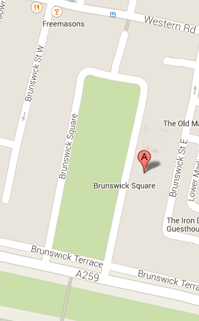22nd August 1831
I have been very cast-down these last few days – as has most of the town, I think. We all agree that this modern world is becoming a much more chancy and difficult place to the way the world was when we were young.
John Coachman says it is because people’s minds are becoming addled with all these new inventions; and that the natural pace of our lives is getting faster and faster.
Why, within a few years, we are told, there will be a railway line all the way from London to Brighton. 'Tis said ordinary folk will be able to travel down for an afternoon on the Promenade and spend the night; watch the Sunday morning parade along the Steine, and be back home again by Sunday night! Did ever you hear the like? (Eliza smiles and says it sounds exciting. But to me it’s all of a piece with the horrors visited upon poor Celia: – we are suddenly a country of such progress as we, ourselves, can't keep up!)
How does a man such as that John Holloway get a notion to chop his wife and babby up into pieces - as if they were nought but a side of beef? Whence came such an idea, we all wonder? In my grandam's day it would have been put down to an evil spell, or witchcraft. Indeed there are those who mutter darkly of it now.
There is still no news of what has happened to my sweet little friend’s head. (The stable lad says if he wanted rid of such he would throw it down the privy and be done: so I boxed his ears for saying such a heathenish, unnatural thing.)
The latest word now is that John Holloway was craven at the last and called for his mistress (for I will not dignify such with the title of ‘wife’) to aid in his nefarious deed. A strong, healthy working-man unable to subdue such a little titmouse of a person such as Celia? I find that difficult to conceive of!
The kitchen maids be all a-feared to go out on their own; Daft Mollie has roused the house with her shrieks and night-terrors, each night since we learned of the foul deed; and I am heart-sick and wish to put all the wicked business from my head.
So,for respite, I shall return to older times and better days when I and all the world, was young: -
I’ve told how we moved to England after the death of my father. We didn’t stay long at the little cottage close by the strand, that we had patched and cobbled together upon arrival. Mind, it was long enough indeed for Joan to decide to take service in a nearby Manor - from whence she never again came to visit her family.
Thus my grandmother, having heard from an old friend who lived in Grantham, that a healer would be both well-thought-of and well-patronised in this small village, be-thought herself of moving to a more permanent home.
And so we travelled: upwards through England by slow, easy stages for the whole of one summer when I was twelve years of age.
Whenever I think back to my childhood now my thoughts stray to that summer when - at least in my recollection - no rain ever fell, nor cold breeze blew. In those days the country was at peace; the hedges and by-ways had yet to be peopled with soldiers crippled and deformed from the battles with that Boney. Or of their widows and babes.
The very seasons had blossomed more mildly than the days of freezing and floods and hunger that both my mother and grandam remembered from their own youth. We three were free from all the worries and cares of the cottagers and farmers and goodwives we met along the way.
And 'twas this time, I warrant, which gave me a taste for the gypsy life which was to call to me but two years later.


